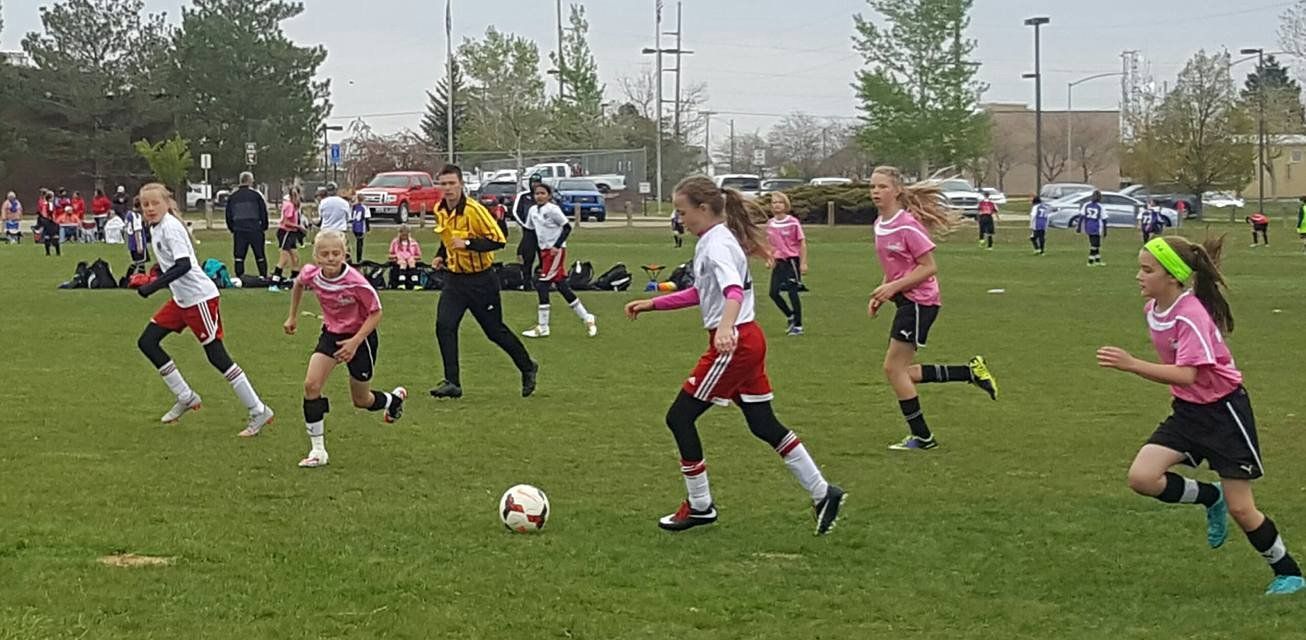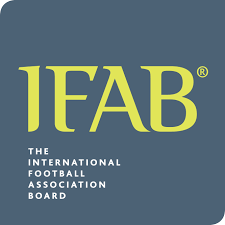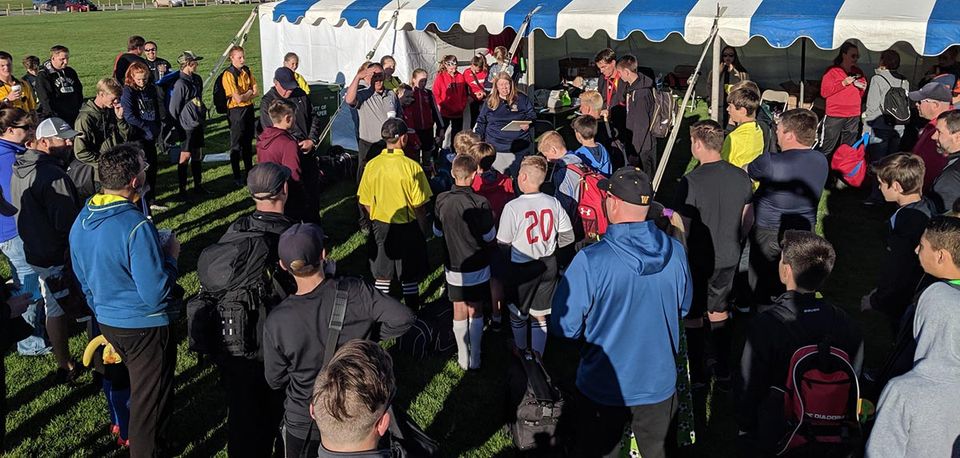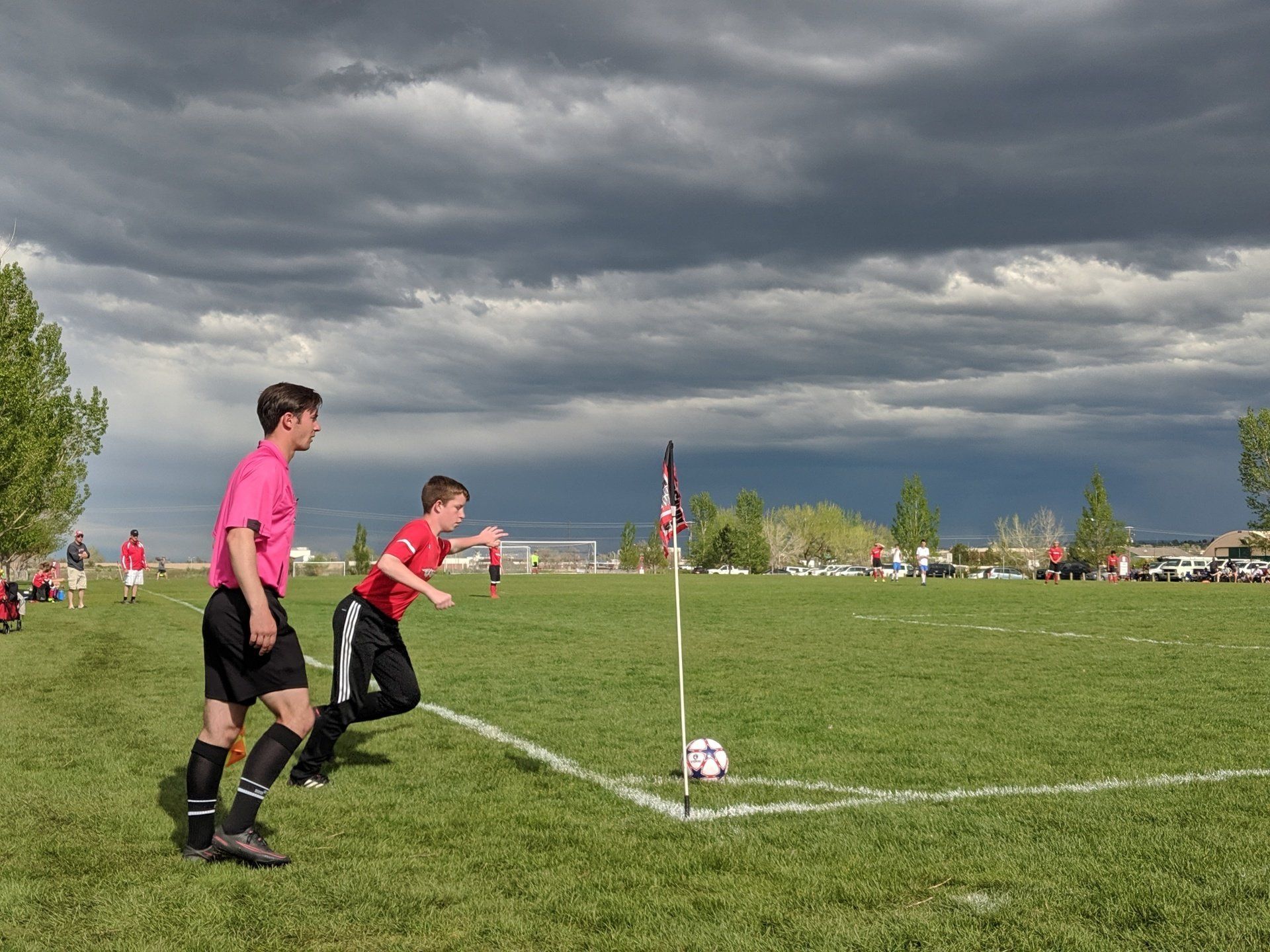Why Become A Referee?
State Director Referee Communications • January 29, 2020
What do I get out of becoming a Referee?
Why Become a Soccer Referee??
If you're on this site, you've at least considered the idea of putting on the jersey, badge, and whistle and taking charge of a game. Refereeing can be an enjoyable and fun experience, and a great way to stay involved in the beautiful game of soccer. People Referee for a Variety of reasons; My kids play, I used to Play, My sibling plays so I am already there, or a simple love of the game. Read on for some of the great benefits of being a Referee!
EXERCISE
Refereeing a soccer game is good exercise. You can be outside and run around, enjoy exciting games, and make a few dollars. It can keep you in shape for your own sports, help you lose weight, or just have some fun. Moving and staying active is one of the most important steps you can take for your own health and refereeing has both of those built right in.
THE KIDS
The game needs referees. Referees are there to make sure the game is fair, fun, and safe. You are doing a service to the community and to the players, coaches, and fans. Just remember, people have been playing the beautiful game for a long time and some of the best games ever played were in backyards, parks, or backstreets without a single fan, coach or referee. Just players who wanted to play and just enjoy kicking the ball around. You are not bigger than the game, but are there to serve the game.
CHALLENGE
Life is full of challenges and being a referee is a perfect way to learn how to meet them head-on and know that you can handle them. Soccer is an emotional game. Players get excited. Fans get excited. Coaches get excited. Learning how to cope with their emotions while keeping yours in check will serve you well throughout your life. Other challenges are pushing yourself to learn more, run longer and faster, and work better with your partners. Simply put, you can push yourself to improve with each match you work. As the referee, you are in charge and your decision is final. However, that does not mean you are not responsible for your actions and decisions, or that you are all-powerful. A referee who officiates because of the power usually does not last long. Players, coaches, fans, and fellow officials sense this power hunger and soon want to avoid you.
MONEY
There are not too many things that a young person can do that pays as well as being a soccer referee. You can work a few hours and make some pretty good money. As you improve and work higher level games, the money improves. The hourly rate is higher than working at a fast-food restaurant and you get to work outside. Don't kid yourself though. You won't get rich and the season does not go year-round. There will some weekends where you want to do other things. The money is good but it's not worth it all by itself. You need to look for more than just money to enjoy being a referee.
KNOWLEDGE
Knowledge is a great thing. The more you know, the more you can do and see. With a complete knowledge of the Laws of the Game, you are better referee, a better player, a better coach, and a better fan. This online training and the field session that follows it is the beginning of this journey to learn more about the game and the Laws. The laws change and get adjusted in small ways each year, so there is always the opportunity to learn. As a coach, I always encouraged my players to referee for a lot of these reasons, but the best and simplest reason: You will see the game differently as a Referee or Assistant Referee, and that knowledge will carry over with you as a player and improve your game.
FRIENDSHIP
Becoming a Soccer official is a great way to meet friends that have similar interests. You will get to work with a variate year of people referee mentors and instructors. The referee community in Wyoming is a very family friendly atmosphere, and you will have the chance to make friends with officials from all over the state. Working with different referees help you understand about how different people can be so much like you and that you have as much to learn from them as they have to learn from you. Some of the people you will meet will become your friends for the rest of your life. Take the time to get to know them in the ref tent. The laughter and stories there are one of the best parts of being a youth soccer official.
You might also like

Parenting is hard. You’re busy. Let 50 other parents do the yelling for you. What tiger-mom or wolf-dad would lure their kid into oftentimes esteem-destroying youth soccer officiating? Easy: Many parents who have also officiated and thought it did them a world of good. What do they know about how time spent “on-the-flag” or “on-the-whistle” prepares youth to face the world that awaits? Literally speaking: Your kid would have a big leg up on a traffic control highway gig with the Department of Transportation. They’d certainly be able to hit this question out of the park: “Have you ever held a flag while people shot you dirty looks?” Their response: “More than you know, pal.” Seriously: How can these experiences positively shape your teen without you even having to play the heavy? Let’s review how your most often-pleaded and ignored phrases can be heard and heeded by your teen without you having to be the repeating party. Further, let’s cover how youth soccer officiating can be part job, part soft skills development and a big part parenting-by-committee. So, hit the concessions; grab a bag of stale popcorn; pull up a lawn chair, and; let’s dive in. But first, a big disclaimer: I’m NOT advocating for Coaches or spectators to rain abuse down on Officials. We’re doing all that we can as Officials and Administrators to halt that toxic culture. Having said that, there will always be passion and, hopefully, to some lesser extent: dissent and expressions of disappointment in sport by someone at the pitch. It’s a reality in sport. Learning if and/or how to best address it is a critically important skill. It is this adversity that can sharpen the skills of an Official to handle criticism…both on the pitch and off. 1. “I’m not mad at you, I’m just mad” There’s an exposed feeling of making a wrong or sometimes right, but simply unpopular call. Stir in and stir up dozens of passionate parents, a few competitive coaches, and pleading players and that nobody-likes-me feeling can droop even the most confident teen posture. Your youth official will hear EVERY “you’ve got to be kidding me Ref?!?!” lobbed in from the lawn-chair-arm-chair sideline (“touchline” to be more exact for your young official, btw ). It’s oftentimes internalized, soul-crushingly processed, rationalized and hopefully compartmentalized while they’re chasing the next play to remain the under-appreciated overseer of fairness. Simultaneously, they’re attempting to tick through an unending mental checklist: “How much time is left in the match? Are there subs waiting to come in on the next stoppage of play? Are my Assistant Referees (AR’s) trying to get my attention? Did I restart the clock after the last injury? Is that Coach shouting ‘C’mon Ref!’ or ‘C’mon Red!’? What’s next if there’s a tie in regulation time?” Log a few dozen matches and an official is able to literally take it in stride, assuming they stick with it. For those that do, the first time a stressed boss comes unglued during a staff meeting, the battle-tested Referee inside of your youth will be better equipped to be able to remain composed. A co-worker seated nearby will likely muse to others, “That’s good parenting right there.” Maybe not, but a fella can dream.

A summary of the main Law changes for 2019/20 with an explanation for the changes. Substitutes - Law 3 Changes A player who is being substituted must leave the field by the nearest point on the touchline/goal line (unless the referee indicates the player can leave quickly/immediately at the halfway line or a different point because of safety, injury etc.) Explanation To stop a player who is being substituted ‘wasting’ time by leaving slowly at the halfway line (which is not a Law requirement) the player must leave at the nearest point (as with an injury) unless the referee indicates otherwise, e.g. if the player can leave quickly at the halfway line, there is a safety/security issue or the player leaves on a stretcher. The player must go immediately to the technical area or dressing room to avoid problems with substitutes, spectators, or the match officials. A player who infringes the spirit of this Law should be sanctioned for unsporting behavior i.e. delaying the restart of play. Players' Equipment - Law 4 Changes Multi-coloured/patterned undershirts are allowed if they are the same as the sleeve of the main shirt Explanation Manufacturers now make patterned undershirts whose sleeves are the same as the main shirt sleeve; these should be allowed as they help match officials’ decision-making. Medical Breaks - Law 7 Changes Difference between ‘cooling’ breaks (90 secs – 3 mins) and ‘drinks’ breaks (max 1 min) Explanation In the interests of player safety, competition rules may allow, in certain weather conditions (e.g. high humidity and temperatures), ‘cooling’ breaks (from ninety seconds to three minutes) to allow the body’s temperature to fall; they are different from ‘drinks’ breaks (maximum one minute) which are for rehydration. Kick-Off - Law 8 Changes The team that wins the toss can now choose to take the kick-off or which goal to attack (previously they only had the choice of which goal to attack) Explanation Recent Law changes have made the kick-off more dynamic (e.g. a goal can be scored directly from the kick-off) so captains winning the toss often ask to take the kick-off. Dropped ball - Laws 8 & 9 Changes If play is stopped inside the penalty area, the ball will be dropped for the goalkeeper If play is stopped outside the penalty area, the ball will be dropped for one player of the team that last touched the ball at the point of the last touch In all cases, all the other players (of both teams) must be at least 4m (4.5yds) away If the ball touches the referee (or another match official) and goes into the goal, team possession changes or a promising attack starts, a dropped ball is awarded Explanation The current dropped ball procedure often leads to a ‘manufactured’ restart which is ‘exploited’ unfairly (e.g. kicking the ball out for a throw-in deep in the opponents’ half) or an aggressive confrontation. Returning the ball to the team that last played it restores what was ‘lost’ when play was stopped, except in the penalty area where it is simpler to return the ball to the goalkeeper. To prevent that team gaining an unfair advantage, all players of both teams, except the player receiving the ball, must be at least 4m (4.5 yds) away. It can be very unfair if a team gains an advantage or scores a goal because the ball has hit a match official, especially the referee. Team Officials - Laws 5 & 12 Changes A team official guilty of misconduct will be shown a YC (caution) or RC (sending-off)*; if the offender cannot be identified, the senior coach who is in the technical area at the time will receive the YC/RC * Law 12 will have a list of YC/RC offences Explanation The experiment with YC/RC for misconduct by team officials has been successful and has revealed many benefits at all levels, including for young referees dealing with ‘difficult’ adult coaches. If the offender cannot be identified, the senior team official (usually the main coach) in the technical area will receive the YC/RC (as the person responsible for the other team officials). Quick free kick and YC/RC - Law 12 Changes If the referee is about to issue a YC/RC but the non-offending team takes the free kick quickly and creates a goal-scoring opportunity, the referee can delay the YC/RC until the next stoppage if the offending team was not distracted by the referee Explanation Occasionally, an attack is stopped by a cautionable (YC) or sending-off (RC) offence and the attacking team takes a quick free kick which restores the ‘lost’ attack; it is clearly ‘unfair’ if this ‘new’ attack is stopped to issue the YC/RC. However, if the referee has distracted the offending team by starting the YC/RC procedure, the quick free kick is not allowed. For a DOGSO offence, the player will be cautioned (YC) and not sent-off (RC) because the attack was re-started (as when advantage is applied for a DOGSO offence). Goal Celebrations - Law 12 Changes A YC for an ‘illegal’ celebration (e.g. removing the shirt) remains even if the goal is disallowed Explanation Cautions for inappropriate goal celebrations apply even if the goal is disallowed as the impact (safety, image of the game etc.) is the same as if the goal was awarded. Handball - Law 12 Changes Deliberate handball remains an offence The following ‘handball’ situations, even if accidental, will be a free kick: The ball goes into the goal after touching an attacking player’s hand/arm A player gains control/possession of the ball after it has touches their hand/arm•and then scores, or creates a goal-scoring opportunity The ball touches a player’s hand/arm which has made their body unnaturally bigger The ball touches a player’s hand/arm when it is above their shoulder (unless the player has deliberately played the ball which then touches their hand/arm) The following will not usually be a free kick, unless they are one of the above situations: The ball touches a player’s hand/arm directly from their own head/body/foot or the head/body/foot of another player who is close/near The ball touches a player’s hand/arm which is close to their body and has not made their body unnaturally bigger If a player is falling and the ball touches their hand/arm when it is between their body and the ground to support the body (but not extended to make the body bigger) If the goalkeeper attempts to ‘clear’ (release into play) a throw-in or deliberate kick from a team-mate but the ‘clearance’ fails, the goalkeeper can then handle the ball Explanation Greater clarity is needed for handball, especially on those occasions when ‘non- d•eliberate’ handball is an offence. The re-wording follows a number of principles: Football does not accept a goal being scored by a hand/arm (even if accidental) Football expects a player to be penalised for handball if they gain possession/control of the ball from their hand/arm and gain a major advantage e.g. score or create a goal-scoring opportunity It is natural for a player to put their arm between their body and the ground for support when falling. Having the hand/arm above shoulder height is rarely a ‘natural’ position and a player is ‘taking a risk’ by having the hand/arm in that position, including whensliding If the ball comes off the player’s body, or off another player (of either team) who is•close by, onto the hands/arms it is often impossible to avoid contact with the ball When the GK clearly kicks or tries to kick the ball into play, this shows no intention to handle the ball so, if the ‘clearance’ attempt is unsuccessful, the goalkeeper can then handle the ball without committing an offence Free Kicks - Law 13 Changes When there is a ‘wall’ of three or more defenders, the attackers are not allowed within 1m (1 yd) of the wall; an attacker less than 1m (1yd) from the ‘wall’ when the•kick is taken will be penalised with an indirect free kick When the defending team takes a free kick in their own penalty area, the ball is in play once the kick is taken; it does not have to leave the penalty area before it can be played Explanation Attackers standing very close to, or in, the defensive ‘wall’ at a free kick often cause management problems and waste time. There is no legitimate tactical justification for attackers to be in the ‘wall’ and their presence is against the ‘spirit of the game’•and often damages the image of the game. The experiment where, at a defending team free kick in the penalty area, the ball is in play once it is kicked and does not have to leave the penalty area, has produced a faster and more constructive restart. Opponents must remain outside the penalty area and at least 9.15m away until the ball is in play. The same change has been made to the goal kick (see Law 16). Penalty Kick - Law 14 Changes The team’s penalty taker can have (quick) treatment/assessment and then take the kick The goalkeeper must not be touching the goalposts/crossbar/nets; they must not be moving The goalkeeper must have at least part of one foot on/in line with the goal line when the kick is taken; cannot stand behind the line Explanation It is unfair if the kicker needs assessment/treatment and then has to leave the field and cannot take the penalty kick. The referee must not signal for the penalty kick to be taken if the goalkeeper is touching the goalposts, crossbar or net, or if they are moving e.g. the goalkeeper has kicked/shaken them Goalkeepers are not permitted to stand in front of or behind the line. Allowing the goalkeeper to have only one foot touching the goal line (or, if jumping, in line with the goal line) when the penalty kick is taken is a more practical approach as it is easier to identify if both feet are not on the line. As the kicker can ‘stutter’ in the run, it is reasonable that the goalkeeper can take one step in anticipation of the kick. Goal Kick - Law 16 Changes The ball is in play once the kick is taken; it can be played before leaving the penalty area Explanation The experiment that at a goal kick the ball is in play once it is kicked, and does not have to leave the penalty area, has created a faster and more dynamic/constructive restart to the game. It has reduced the time ‘lost/wasted’ including stopping the tactic of ‘wasting’ time when a defender deliberately plays the ball before it leaves the penalty area knowing that all that will happen is the goal kick will be retaken. Opponents must remain outside the penalty area until the ball is in play



